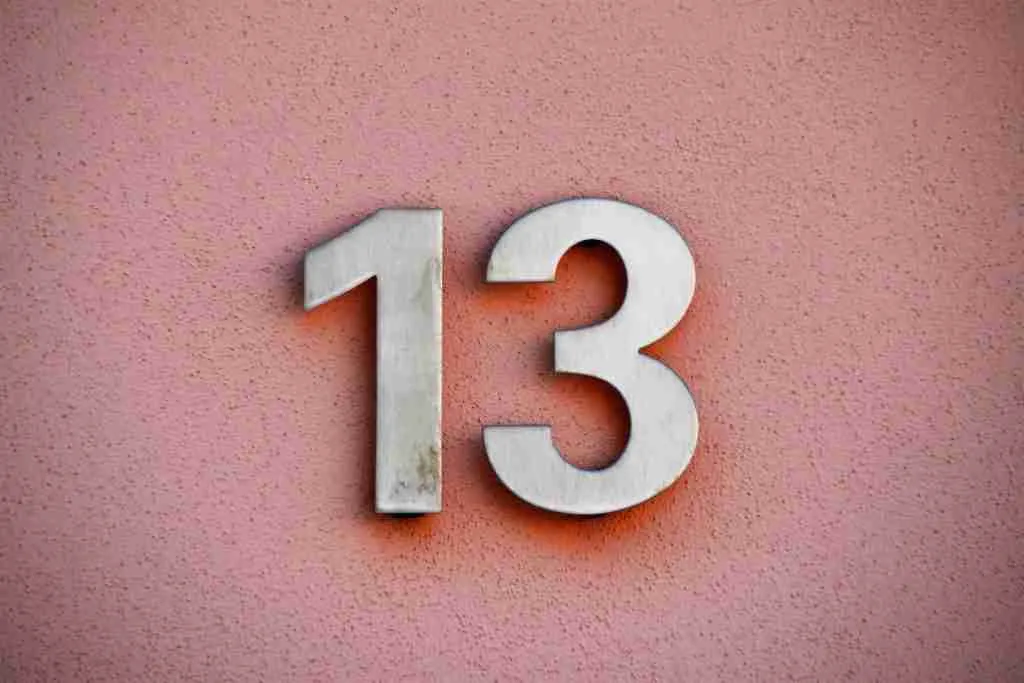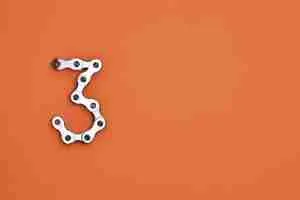26 Fun Facts About The Number 13 You Will Think Twice
-
The number 13 is often considered a symbol of new beginnings and fresh starts.
-
In numerology, 13 is seen as a powerful number representing transformation.
-
Some cultures believe that 13 brings prosperity and good fortune.
-
The 13th day of the month is considered lucky in many cultures, such as in Italy.
-
Taylor Swift embraces 13 as her lucky number, associating it with success.
-
In the Mayan calendar, 13 is sacred, symbolizing spiritual development.
-
The 13th amendment abolished slavery, marking a moment of freedom and progress.
-
The fear of the number 13 is known as triskaidekaphobia, causing anxiety in many.
-
Many buildings skip the 13th floor to avoid unsettling tenants.
-
Friday the 13th is considered the unluckiest day of the year by many.
-
Some airlines skip row 13 on planes.
-
The number 13 is thought to bring bad luck during weddings in some cultures.
-
In some cultures, 13 is believed to bring misfortune in business dealings.
-
The fear of the number 13 has led some people to avoid buying homes with the number.
-
In ancient times, the number 13 was associated with witchcraft and the occult.
Table of Contents
1. Many skyscrapers skip labeling the 13th floor entirely
It’s a common practice in high-rise buildings worldwide to avoid the superstition associated with the number 13. Many elevators will skip from floor 12 directly to 14.
This superstition is so strong that it influences building designs globally. By eliminating the 13th floor, these buildings aim to reduce any negative feelings from tenants and visitors.
2. There is a biblical reference to number 13: “The Last Supper.”
The number 13 also reminds us of the 13 diners at the last supper. Judas, who betrayed Jesus Christ, was the 13th guest to arrive.
It was due to his betrayal that Jesus was arrested and crucified. The Christian community remembers the event.
3. Ancient Egyptians considered 13 a lucky number
The ancient Egyptians viewed the number 13 as sacred and auspicious. It was associated with spiritual development and the afterlife.
They believed that 13 represented the completion of one life phase and the start of another. It symbolized a journey toward spiritual rebirth.
4. Franklin D. Roosevelt disliked dining with 13 people group.
READ ALSO: 20 Fun Facts About The Number 4 That Will Fascinate You
The President of the world’s most powerful country also feared number 13. Roosevelt was somehow a superstitious person. He avoided any travel on Friday the 13th and would stop dining with a group of 13 people.
His biographer, journalist John Gunther, provides all the information.
5. The 13th amendment abolished slavery in the United States.
The 13th Amendment, ratified in 1865, formally abolished slavery across the United States. This marked a major turning point in American history.
It remains one of the most significant changes in U.S. law, granting freedom to millions of enslaved people. The number 13, despite its superstition, was linked to a momentous victory for human rights.
6. The Apollo 13 mission famously suffered an onboard explosion.
Apollo 13, launched in 1970, encountered a life-threatening disaster when an oxygen tank exploded. This forced the astronauts to improvise and use limited resources.
Despite this, the crew returned safely to Earth, marking one of NASA’s most incredible rescue operations. The mission’s outcome became a symbol of human resilience.
7. Auguste Comte created a 13th-month calendar.
In 1849, a French philosopher and sociologist introduced a calendar with 13 months and 28 days each month. The calendar is known as the Positivist Calendar.
The calendar has 364 days in total. The public refused to endorse it because they were unprepared for such a radical change.
8. The number 13 is often left out in seating rows on airplanes.
Many airlines skip row 13 entirely, even though it exists in the seating layout. The fear surrounding the number 13 prompts this common practice.
This subtle avoidance is done to ensure passengers feel comfortable and to reduce any anxiety related to this superstition. It’s a small but significant detail.
9. Sikhism 13 has special significance as it translates into “the supreme.”

READ ALSO: 23 Fun Facts About The Number 2 That Will Surprise You
The number 13 holds special significance as “Tera” in Punjabi, meaning “Yours.” In Sikhism, it symbolizes devotion to the Creator, to whom all belongs.
This is evident when Guru Nanak, the revered Sikh saint, reached the number 13 while counting and exclaimed “Tera,” acknowledging God. This is one of the interesting facts on 13.
10. In tarot, 13 represents transformation and rebirth.
In tarot cards, the 13th card is known as the Death card. However, it doesn’t signify actual death but represents transformation and new beginnings.
It indicates the end of one phase in life and the start of another. This card challenges individuals to let go of the past and embrace new opportunities.
11. Some hotels avoid room number 13 altogether.
In many hotels, room number 13 is often skipped, with the numbering going straight from 12 to 14. This avoids the negative associations with the number 13.
Guests may not even realize the missing number. Hotels do this to maintain comfort and prevent any distress caused by superstitions around the number.
12. The Knights Templar were arrested on Friday the 13th, 1307
On Friday the 13th of October 1307, the Knights Templar were arrested by order of King Philip IV of France. This event has become a significant part of 13’s dark history.
The mass arrest and subsequent persecution of the Knights led to many conspiracy theories. This historic event solidified the connection between Friday the 13th and bad luck.
13. 13 is a prime number.
The number 13 is classified as a prime number. This means it is divisible only by 1 and itself, making it unique in the world of numbers.
Prime numbers like 13 have been used in mathematics for centuries and are essential for number theory. Their properties make them both fascinating and useful.
14. Tuesday the 13th is unlucky too.
In Greek and Hispanic cultures, Tuesday the 13th is believed to bring bad luck due to a string of unfortunate events.
For example, the fall of Constantinople to the Ottomans on Tuesday, 29 May 1453, is one such event. The sum of 1453 adds up to 13, highlighting just one of many interesting, fun facts about the number 13.
Moreover, the perfection of 12 is also compromised.
15. The U.S. flag has 13 strips in red and white.

READ ALSO: 20 Fun Facts About Number 23: Unlocking the Numerical Mysteries
The 13 alternating red and white stripes represent the 13 original British colonies that gained independence from the British Empire.
The original 13 British colonies were Delaware, Pennsylvania, New Jersey, Georgia, Connecticut, Massachusetts, Maryland, South Carolina, New Hampshire, Virginia, North Carolina, and Rhode Island.
16. A full moon on Friday the 13th is rare and ominous.
A full moon on Friday the 13th is a rare occurrence, adding extra mystery and superstition to the day. This combination is often considered a bad omen.
Many cultures believe it amplifies negative energies, making the day even more foreboding. Some people even avoid making important decisions on this rare date.
17. The Last Supper had 13 people seated—Judas was the 13th
In the famous scene of the Last Supper, there were 13 people at the table, including Jesus and his 12 apostles. Judas Iscariot, the betrayer, is considered the 13th guest.
This association with betrayal and misfortune is one of the main reasons why 13 is seen as unlucky in many cultures. It’s a strong cultural link to the number’s negative connotations.
18. Some elevators go from floor 12 to 14, skipping 13.
To avoid triggering the fear of the number 13, many elevators skip labeling the 13th floor. Instead, the floors go directly from 12 to 14.
This practice is common in buildings around the world, especially high-rises. It’s a subtle but noticeable way of respecting superstitions without explicitly acknowledging them.
19. The Chinese generally don’t fear the number 13.
Unlike Western cultures, Chinese people typically do not associate the number 13 with bad luck. In fact, 13 is seen more neutrally or even positively.
The number 4, on the other hand, is often feared because it sounds like the word for “death” in Chinese. In Chinese numerology, 13 may even symbolize definite prosperity.
20. The 13th full moon is called the blue moon.

READ ALSO: 21 Fun Facts About The Number 3 That Will Surprise You
It can be seen roughly every two and a half years, but did you know some interesting, fun facts about the number 13? A lunar eclipse occurs when the reflected light from the moon is blocked by something before reaching the earth’s surface.
The color of white changes to blue. “once in a blue moon” refers to the rarest events.
21. The 13th element on the periodic table is aluminum.
Aluminum, the 13th element, is a versatile and lightweight metal used in many industries. Its use ranges from construction to aerospace engineering.
Known for its resistance to corrosion, aluminum plays an essential role in manufacturing. Despite the number 13’s superstition, aluminum is a highly valued material worldwide.
22. The number 13 appears in the Bible multiple times.
The number 13 appears in various biblical references, often with different interpretations. In some cases, it symbolizes rebellion or misfortune.
In other instances, 13 is linked with the fulfillment of promises and blessings. Its varied presence in scripture adds complexity to its symbolism in Western culture.
23. The number 13 was used to represent rebellion in the 19th century.
In the 19th century, the number 13 was adopted as a symbol of rebellion and defiance. It was associated with resistance movements and uprisings.
Revolutionaries used the number to symbolize their opposition to authority. Over time, it became a symbol of breaking free from established norms.
24. Taylor Swift is obsessed with the number 13.

READ ALSO: 23 Fun Facts About the Number 20 You Probably Didn’t Know
Taylor Swift herself explains why she likes the number 13. It is obvious because she was born on December 13.
She turned 13 on Friday the 13th, and her first album went gold in 13 weeks. Moreover, her first song that ever went number 1 had an intro of 13 seconds.
25. In some cultures, 13 is associated with witches’ magic.
In various spiritual traditions, the number 13 is linked to witches and magical practices. It represents power, knowledge, and connection to the supernatural.
In some traditions, 13 is considered a sacred number, empowering rituals and spells. Its association with witches makes it a significant part of occult practices.
26. Many cars are not sold with the number 13 in their license plates.
Many people avoid having the number 13 on their vehicle license plates because of its unlucky associations. This is common in countries with strong superstitions.
Some car owners specifically request a plate that avoids the number 13, believing it could bring bad luck. In some areas, plates with 13 are even less available for purchase.
FAQS
There are many superstitions and beliefs surrounding the number 13. Some consider it unlucky, while others think it is a lucky number. Many buildings do not have a 13th floor, and some airlines do not have a 13th row.
There are a few theories on why 13 is considered an unlucky number. One theory is that it is linked to the Last Supper, where 13 people were present. Another is that it is related to the Norse god Loki, known for causing mischief.
Yes, some people consider 13 to be a lucky number. This is often because 13 is seen as a number of completeness and perfection. There are also 13 lunar cycles in a year, some people see promising.
Some people feel anxious or uneasy when encountering the number 13, while others may not think anything of it.
The number 13 has several famous uses. One is the number of stripes on the United States flag, and another is the number of original colonies in the United States.
The number 13 in numerology is considered a karmic number representing transformation, upheaval, and change, with positive and negative aspects. It can be associated with intuition, spiritual awakening, and the ability to adapt to change and transform oneself, but it is also sometimes associated with bad luck or superstition. The meaning of 13 in numerology depends on various factors, including personal numerology charts and cultural backgrounds.
Yes, 13 can be considered a unique number for various reasons. In many cultures, it is associated with superstition and bad luck; in others, it is seen as a powerful and transformative number. It is also a prime number, which means it can only be divided by one and itself. It is often skipped in building floors, hotel rooms, and airplane rows due to its perceived negative connotations. While 13 may have negative associations in some cultures, it is still a significant and exciting number with unique properties.
In many Western cultures, 13 is considered unlucky due to its association with adverse events. However, in other cultures, such as Chinese and Indian numerology, 13 is not regarded as unfortunate and can be seen as a powerful and transformative. Whether or not 13 is considered lucky depends on cultural beliefs and personal experiences.
The number 13 does not hold any particular significance in Hinduism. The religion instead emphasizes numbers such as 3, 5, 7, and 9, which are considered auspicious.





